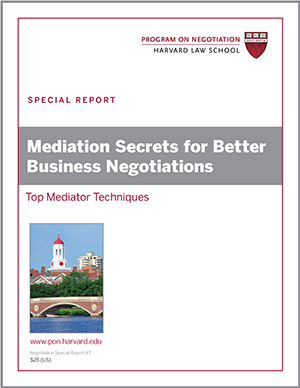
During his years as George H.W. Bush’s Secretary of State, one of James A. Baker’s III, goals was to encourage the free-market reforms that Communist Party of the Soviet Union General Secretary Mikhail Gorbachev had launched in the late 1980s. One day during his tenure, a high-level Bush administration official commented in the press that Gorbachev’s efforts were sure to fail. Baker called Bush to complain. “I said, you can’t have other people pontificating about these major foreign policy matters when this is one of our goals, and it’s totally contrary to our policy,” he said. “So they cut the knees off of this particular individual, and we didn’t hear that anymore.”
Baker shared this story on March 29, 2012 while receiving the 2012 Great Negotiator Award from the Program on Negotiation at Harvard Law School and the Future of Diplomacy Project at Harvard Kennedy School. In discussion with Harvard faculty at the Great Negotiator event, Baker elaborated on his greatest challenges as Secretary of State and shared negotiation lessons learned over the course of his long, successful career as a lawyer, campaign manager, and diplomat.
Baker’s anecdote about the Bush administration official who went off message raises compelling questions about the best way to manage conflict in negotiating teams when it emerges.
To prevent conflicts among diverse, strong-minded team members from overshadowing group goals, Professor Elizabeth Mannix of Cornell University advises the negotiation team to spend at least twice as much time preparing for upcoming talks as they expect to spend at the table. Because the other side will be ready and willing to exploit any chinks in your team’s armor, it’s important to hash out your differences in advance.
Start by encouraging the team to brainstorm and debate the issues to be discussed during the talks. Spend timed debating goals, the team’s best alternative to the present agreement, and your reservation point – the worst outcome you, as a team, will accept. Then, spend just as much time exploring the other side’s likely goals, background, alternatives, and reservation point. Having trouble coming to agreement on the facts? Teams sometimes resolve substantive differences by bringing in experts for guidance on areas of confusion, Kristin Behfar (University of California, Irvine), Ray Friedman (Vanderbilt University), and Jeanne Brett (Northwestern University) found in interviews with experienced team negotiators.
What about personality conflicts? In the Behfar study, some negotiators described the problem of coping with highly confrontation or emotional group members. Teams that overcame this difficulty did so by practicing their negotiation script in advance with the goal of directing and controlling the behavior of volatile members. To avoid conveying weakness to the other side, rather than calling for a break at the first sign of trouble, some teams devised secret signals they could use to bring wayward members in line – for instance, someone might stretch out her arms to communicate to another member that he’s getting off track.
Related Mediation Article: Arbitration vs Mediation: Teambuilding Using Negotiation Examples from Real Life – Which alternative dispute resolution process (ADR) is right for your conflict? In conflict management, there are many different avenues disputants can take to resolve their conflict – they can litigate it in the court system, they can hire a third-party neutral mediator to help them see eye-to-eye, or they can engage in arbitration, in which, like mediation, a third party is present but instead imposes a decision on the disputants. What dispute resolution process is right for your team? Learn conflict management skills drawn from negotiation research in this article.
Adapted from “Lessons in Diplomacy: Building a Successful Negotiating Career,” first published in the Negotiation newsletter, July 2012, and “The Surprising Benefits of Conflict in Negotiating Teams,” first published in the Negotiation newsletter, February 2009.
Originally published in 2012.





Thank you for this clarification of the difference between arbitration and mediation and the useful insights that can be used by a team in these negotiations.
From my experience I have seen that designating a lead negotiator also helps. In complex deals you may have multiple leads with the “money guy” having the overall lead (for eg on a construction deal, one commercial and one technical lead negotiator would be appropriate with the overall lead being with the commercial lead). In our negotiations (where contracts having hundereds of key elements and valued at Millions of dollars) we not only set that up, we also informed the counterparty that that is how the authorities lay in the team. So in case a “non lead” made a comment it was understood that he/she did not speak for the company and it was just a personal opinion. In all my negotiations, I had just one all hands prep session wherein all our team members were made to understand their roles and authorities. During this session we also discussed, argued and agreed upon our BATNA and reserve positions for all the key terms. This resulted in seamless negotiations despite spending long hours stretching over months with the counterparty, never once was a word said that was out of place.